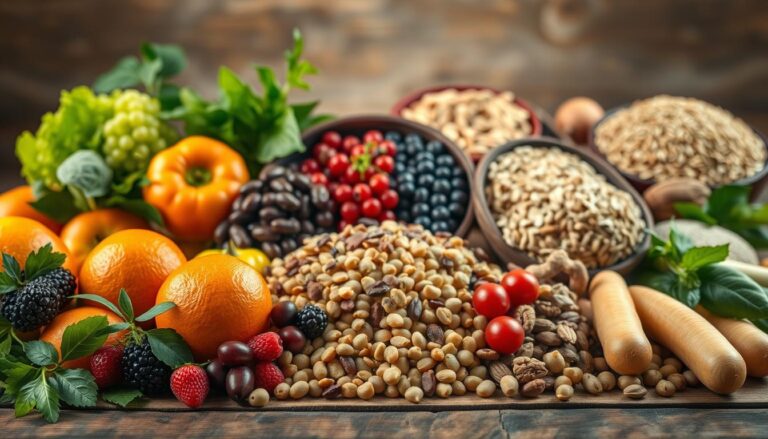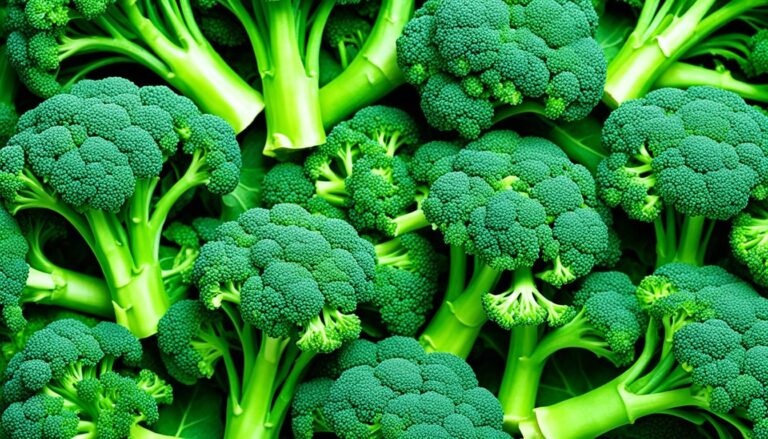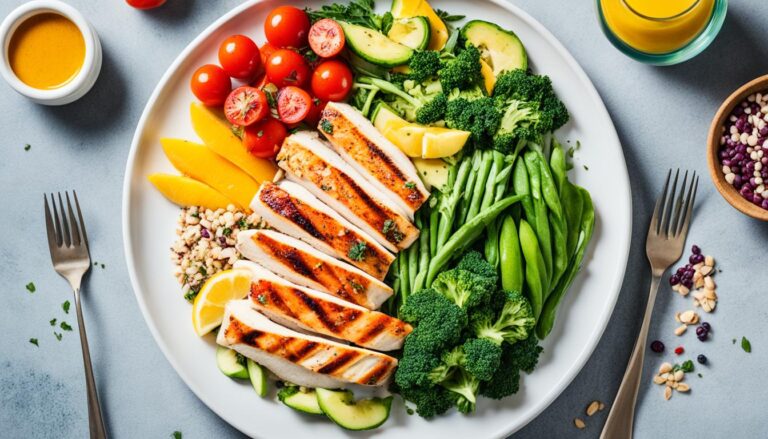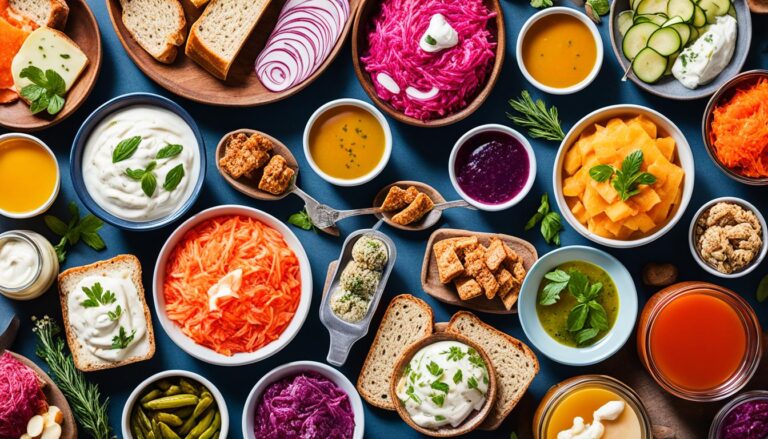Could the secret to luminous skin be in your grocery list? This article uncovers the vitamins for radiant skin that experts say are key.
They help reduce wrinkles fade dark spots and boost natural glow. Studies show that essential vitamins for skin like Vitamin C and E repair damage and promote renewal at a cellular level.
Recent studies in Nutrients confirm Vitamin C’s role in collagen synthesis. Vitamin A impacts cell turnover to reduce blemishes. Even sunlight helps the body makes Vitamin D from cholesterol when exposed to UV rays aiding psoriasis treatment. Yet many overlook dietary deficiencies like low Vitamin A levels linked to acne, when tackling skin issues.
This guide explains how vitamins work both inside and outside the body. Find out why eating salmon, nuts, and leafy greens is key. Also, learn how B vitamins like B3 and B5 prevent irritation and early aging. Discover how combining these nutrients can tackle dark circles and sun damage.
Key Takeaways
- Vitamin C increases collagen production, reducing wrinkles and improving skin tone.
- Topical and dietary Vitamin D combats psoriasis and boosts cell repair.
- B vitamins B3, B5, B7 hydrate skin, reduce inflammation, and protect against UV damage.
- IV drips offer 100% bioavailable nutrients for accelerated skin renewal.
- A balanced diet with vitamins A, C, E, and B complex prevents breakouts and premature aging.
Understanding How Vitamins Impact Skin Health

Healthy skin needs a mix of vitamins from inside and outside. skin health vitamins help cells grow, make collagen, and protect against harm. Getting these vitamins right helps keep your skin looking good and fixing any damage.
The Science Behind Nutrient Absorption and Skin Renewal
Vitamins go from your stomach to your blood and then to your skin cells. For example, vitamin A helps cells turn over making your skin clearer. vitamin C helps make collagen making your skin firmer. Doctors say not getting enough vitamins can make your skin age faster.
Your skin is a reflection of what you consume.
This shows how important what you eat is for your skin.
Internal vs. Topical Application of Skin Vitamins
Eating vitamins for healthy skin helps your body overall. But using creams and serums puts vitamins right on your skin. Here’s how they compare:
| Method | Benefits | Examples |
|---|---|---|
| Internal | Long-term renewal | Oranges vitamin C salmon vitamin D |
| Topical | Targeted repair | C serums, retinol creams |
IV drips are better absorbed than pills great for serious vitamin needs.
Signs Your Skin May Be Lacking Essential Vitamins
- Chronic dryness or flakiness
- Slow wound healing
- Persistent breakouts or dermatitis
- Pale or splotchy discoloration
These signs might mean you’re not getting enough vitamins A, C, or B3. Eating well, with lots of greens, nuts, and fish helps a lot. Adding creams and serums can make your skin even better.
Vitamin C The Collagen Booster for Firm, Youthful Skin
Vitamin C is key for skin care. It helps make collagen, which keeps skin firm. Without enough, collagen production drops, causing wrinkles and sagging.
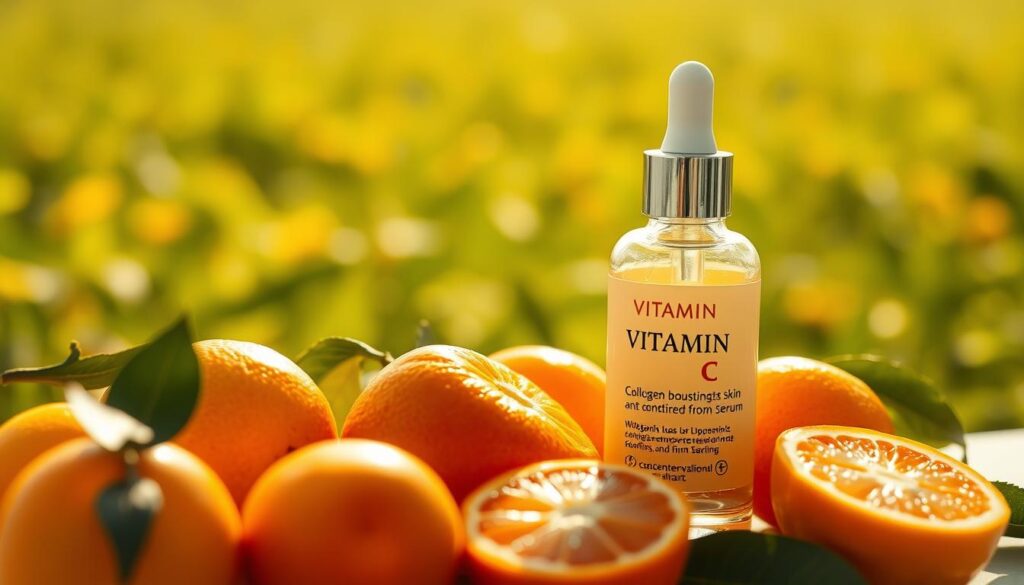
Vitamin C also fights off damage from UV rays and pollution. This helps prevent early aging. Eating and applying vitamin C together boosts skin health. For instance eating avocados can make skin more elastic by increasing collagen.
Key dietary sources include:
- Oranges 70 mg vitamin C per medium fruit
- Red bell peppers 149% DV per ½ cup
- Kiwi 64 mg per fruit
- Broccoli florets 81 mg per cup
Dark chocolate, 20 grams a day, can make skin more hydrated and resistant to UV rays. Eating it with citrus fruits helps it work better. But too much can upset your stomach. For the best results, eat vitamin C-rich foods and protect your skin from the sun.
Vitamin E Nature’s Antioxidant Shield for Skin Protection
Vitamin E the skin-friendly vitamin, has gained significance in the skincare world thanks to its ability to block free radicals helping to slow the aging process of the skin.
Vitamin E is a strong defender against environmental stressors. It fights off free radicals that harm collagen and elastin. These proteins are key for skin health. Vitamin E also absorbs UV radiation making the skin stronger and reducing sun damage.
How Vitamin E Combats Free Radical Damage
This nutrient works by integrating into cell membranes. It neutralizes harmful oxygen species that cause aging. Studies show it can cut oxidative stress by 40%, as reported in dermatology journals. Vitamin E is great for keeping the skin healthy and moisturized.
Best Food Sources Rich in Vitamin E
| Food Source | Serving Size | Vitamin E (mg) |
|---|---|---|
| Almonds | 1 oz 23 nuts | 7.3 |
| Sunflower Seeds | 1/4 cup | 15 |
| Avocado | 1 medium | 2.7 |
| Kale | 1 cup raw | 0.6 |
| Spinach | 1 cup cooked | 2.9 |
Other sources include:
- Hazelnuts 4.3 mg per ounce
- Pumpkin seeds 2.6 mg per tablespoon
- Wheat germ oil 20.3 mg per teaspoon

Synergistic Effects When Combined with Vitamin C
Vitamin E and Vitamin C work better together. Vitamin E helps Vitamin C last longer, protecting the skin even more. Dermatologists suggest using both in skincare for better UV protection. Studies show this combo reduces sun damage by 30%.
Adding these skin-nourishing vitamins from almonds and greens is good. Using products with both vitamins gives the best results.
Vitamin A The Cell Regenerator for Smooth, Clear Skin
Vitamin A is a key player among best vitamins for skin. It helps cells regenerate, keeping skin healthy. It comes in two forms: retinoids from animals and carotenoids from plants. Both are important for skin health.

- Acne Management: Taking a small amount 20 mg/day can help control oil glands and prevent clogged pores. This helps with severe acne.
- Wound Healing: It boosts collagen production, which helps wounds heal faster and reduces scarring.
- Anti-Aging Effects: Vitamin A helps make more collagen which makes skin look smoother and more elastic.
Not getting enough Vitamin A can harm the skin’s barrier, making it more prone to infections. Adults need 700–900 mcg every day. Too much can be harmful. Good sources include liver, sweet potatoes, spinach, and carrots. For example, ½ cup of cooked carrots has 2.7 mg of beta-carotene.
When choosing vitamins for healthy skin pair Vitamin A with moisturizers to help it absorb better. Pregnant women should talk to their doctors before taking high doses because of risks.
Taking Vitamin A with antioxidants like Vitamin C can enhance collagen benefits. But don’t take iron supplements at the same time because they can interfere with Vitamin A absorption.
7 Vitamins for Glowing Skin and Their Food Sources
Adding foods rich in skin vitamins to your diet can make your skin glow. Here’s how to add these nutrients to your daily meals:
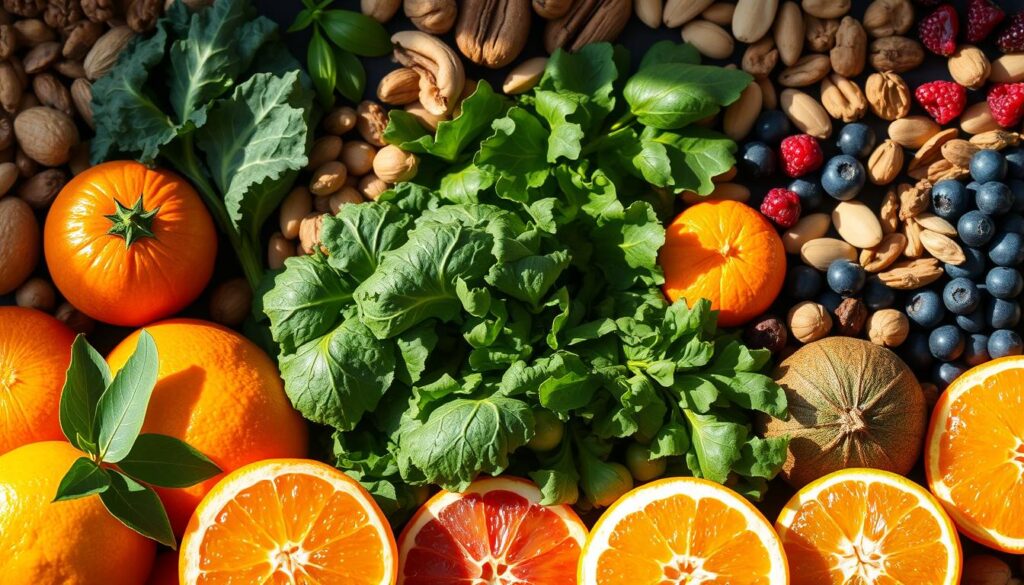
Creating a Skin-Friendly Meal Plan
- Vitamin A: Add carrots, sweet potatoes, or spinach to salads or smoothies.
- Vitamin C: Include bell peppers, strawberries, or citrus fruits in your snacks and meals.
- Vitamin E: Snack on almonds or avocado for healthy fats.
- Vitamin D: Drink fortified milk and get some sunlight for best absorption.
- Vitamin K: Eat leafy greens like kale for clear benefits.
- B Vitamins B3/B5: Choose chicken, whole grains, or eggs for a balanced diet.
Seasonal Availability of Vitamin Rich Foods
Plan your meals with seasonal produce for freshness and savings:
- Spring: Enjoy asparagus folate B vitamins and strawberries vitamin C.
- Summer: Try tomatoes lycopene and watermelon vitamin C.
- Fall: Squash vitamin A and pumpkin seeds vitamin E are great.
- Winter: Citrus fruits vitamin C and fortified dairy vitamin D are good choices.
Budget Friendly Options for Nutrient Rich Foods for Skin
- Buy frozen berries or broccoli florets instead of fresh.
- Choose canned tuna or chicken for affordable B vitamins.
- Freeze seasonal produce in bulk for later.
- Opt for fortified cereals or whole grains for B vitamins.
Combine these dietary tips with plenty of water and sunscreen for best results. Eating these nutrient rich foods for skin keeps your skin healthy without breaking the bank.
Vitamin D The Sunshine Vitamin for Skin Repair
Vitamin D is key for skin repair and growth. It acts as a vitamin and hormone helping cells grow and heal. It also reduces inflammation. Without enough, skin problems like psoriasis can occur.
Worldwide, 1 billion people lack enough vitamin D. In the U.S., 75% of Black adults don’t get enough. Sunlight is important but sunscreen blocks most of it.
In places like Boston, the sun is scarce for 4 months. This makes getting enough vitamin D hard.
| Food Source | Serving Size | Vitamin D IU | % Daily Value |
|---|---|---|---|
| Mackerel | 3.5 oz | 643 IU | 80% |
| Fortified Milk | 1 cup | 115 IU | 15% |
| Salmon wild | 3.5 oz | 924 IU | 115% |
| Egg Yolk | 1 large | 37 IU | 5% |
Adults need 600 IU of vitamin D daily, more after 70. Not getting enough can slow healing and increase infections. Supplements have become more common, but too much can be harmful.
It’s important to find a balance. Getting 10-30 minutes of sun in the middle of the day a few times a week is good. Adjust based on your skin and where you live.
Eat fatty fish fortified foods, and consider supplements. Blood tests can check your vitamin D levels. Always practice safe sun habits and talk to a doctor for advice.
B Vitamins The Complete Complex for Skin Hydration
B vitamins work together to keep your skin hydrated and help your cells renew. They help your skin hold moisture and fight inflammation. They also make your skin stronger against damage from the environment and aging.
Niacinamide helps to reduce redness, minimize pores, and even out skin tone. It strengthens the skin’s protective barrier making it more resilient to environmental damage.
B7 Biotin helps your skin’s barrier and fights skin problems. You can get biotin from foods like eggs and almonds. But, taking too much doesn’t help much.
Biotin B7 The Beauty Vitamin for Hair and Skin
Not having enough biotin can make your skin dry and brittle. Eating foods like walnuts and legumes helps keep your skin moist. You don’t need to take a lot of supplements.
Niacin B3 The Anti-Inflammatory Powerhouse
Getting 14–16 mg of niacinamide a day can help with inflammation and skin issues. Using products with 2%–5% niacinamide can help with rosacea and acne.
Pantothenic Acid B5 The Moisture-Balancing Nutrient
Pantothenic acid B5 helps make lipids and keep moisture in your skin. Foods like avocados and mushrooms are good sources. They help your skin stay moist and calm.
Adding these vitamins to your diet or skincare products is good for your skin. They help keep your skin hydrated, elastic, and strong against aging.
Vitamin K The Healing Agent for Dark Circles and Bruising
Vitamin K is key for healing wounds and fading dark circles. It helps blood clot, which speeds up healing from bruises. It also reduces under-eye darkness by clearing blood under the skin.
Eating leafy greens like kale and spinach boosts Vitamin K. Broccoli and fermented foods also help. There are two types: K1 for clotting and K2 for calcium and repair.
- Leafy greens: Kale, spinach, Swiss chard
- Cruciferous vegetables: Broccoli Brussels sprouts
- Other sources: Olive oil, soybeans, and dairy products
Using Vitamin K creams can help bruises quickly. Eating foods rich in Vitamin K helps heal from the inside. Adding these skin health vitamins to your diet keeps your skin strong and healthy.
Conclusion Building Your Daily Routine for Vitamin Rich Skin Nourishment
Nutrient-rich foods are key to a glowing skin. Eating foods high in vitamins like citrus fruits, almonds, and leafy greens is essential. These foods give your body the vitamins it needs naturally.
Vitamin C in citrus fruits boosts collagen, while vitamin E in almonds protects your skin from harm. Adding B vitamins from whole grains and proteins helps keep your skin hydrated and strong. This helps with dryness and inflammation.
Eating a balanced diet is the best way to get these nutrients. But, supplements or treatments like vitamin IV therapy can help if you’re missing out. For example getting vitamin D from the sun or fatty fish is great.
Using skincare products that match your diet can make your skin even better. For example, using vitamin C serums with citrus fruits.
Staying consistent with these vitamins helps fight aging, acne, and dryness. Always watch for changes in your skin and talk to a doctor if needed. By eating right, protecting your skin from the sun, and making smart choices, you’ll have healthy skin every day.
